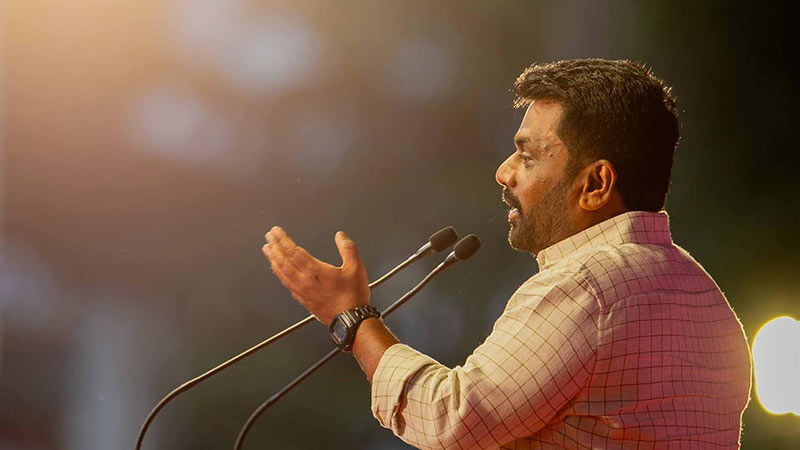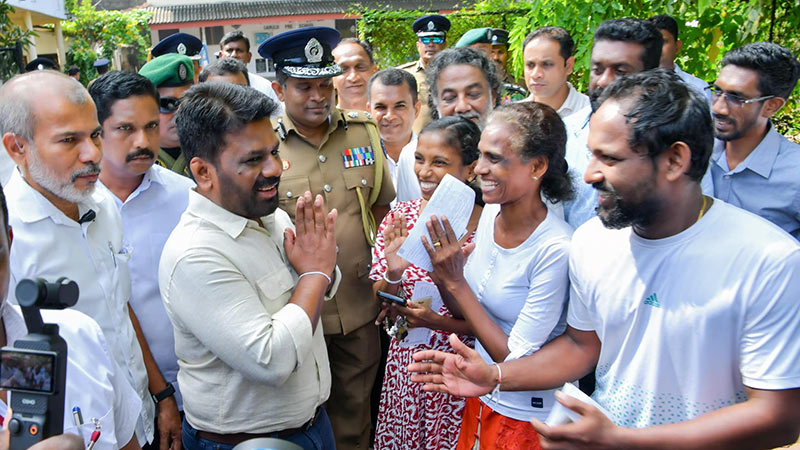Sri Lanka’s 2024 Parliamentary Election: What message did the people send through the results?

Sri Lankan President Anura Kumara Dissanayake. Photo: Official Facebook page of the President.
BBC Sinhala has analyzed the remarkable victory of the National People’s Power (NPP) in the 2024 Parliamentary Election in Sri Lanka under the headline: ‘What is the message the people conveyed through the general election result?’
The following is a translation of the BBC Sinhala article:
What is the message the people conveyed through the general election result?
The results of Sri Lanka’s 2024 parliamentary election have been fully released.
The outcome reveals that a majority of Sri Lankans have placed their trust in the policies of the National People’s Power (NPP) and decided to support it. Several key points are highlighted through the election results:
Rejection of the Elite Class

Sri Lankan President Anura Kumara Dissanayake engages with people after casting his vote in the 2024 Parliamentary Election. Photo: Official Facebook page of the President.
The election results indicate a public desire to completely transform the governance structure dominated by elite politicians for over seven decades.
The slogan “End Elite Politics,” which was prominent during the 2022 anti-government protests, became a central theme in the NPP’s campaign. Consequently, the majority’s support for the NPP signifies their mandate to dismantle this long-standing system.
Several elite and veteran politicians, including former President Ranil Wickremesinghe, decided not to contest this election, with many opting for retirement.
Furthermore, traditional faces of the opposition alliance, the Samagi Jana Balawegaya (SJB), the former ruling Sri Lanka Podujana Peramuna (SLPP), and the New Democratic Front, were decisively rejected by the people.
Despite repeated assertions by former leaders about the necessity of experience in governance, the majority chose to entrust power to a new and younger generation of leaders from the NPP.
Public Discontent with Corruption
Commenting on the results, Professor Wasantha Athukorala from the Department of Economics & Statistics at the University of Peradeniya stated:
“For years, people perceived Parliament as being filled with thieves. They held politicians responsible for the suffering they endured and wanted to overthrow the entire system that represented the old elite class.”
As a result, a significant portion of the newly elected parliamentarians representing the NPP are newcomers and members of the younger generation.
Increased Confidence in the President
Compared to the 2024 presidential election, the NPP saw a substantial surge in votes during the parliamentary election. This reflects growing public approval and trust in President Anura Kumara Dissanayake’s leadership and policies.
In the previous parliamentary election, the NPP secured just 3% of the votes, winning only three parliamentary seats. However, this time, the NPP made history by securing 159 seats in Parliament and winning 6,863,186 votes, marking a historic victory.
Grassroots-Driven Campaign
Unlike traditional campaigns fueled by monetary incentives like alcohol and food parcels, the NPP’s ground-level election campaign was largely organized voluntarily by the public.
Dr. W.A. Wijewardena, a former Deputy Governor of the Central Bank of Sri Lanka, described this as a significant departure from past practices, highlighting it as a positive trend.
Rejection of the Rajapaksa Family
Another striking outcome is the collapse of the power center that the Rajapaksa family dominated for decades.
The only Rajapaksa family member to contest this election, Shasheendra Rajapaksa, was also unsuccessful.
Notably, the NPP won key strongholds like Tangalle and Mulkirigala, historically dominated by the Rajapaksas.
Northern and Eastern Transformation
During the previous presidential election, President Anura Kumara Dissanayake received minimal support from the Northern and Eastern provinces.
However, his outreach efforts following his election appear to have gained the trust of the Tamil population in these regions.
For the first time, the NPP surpassed ethnically-based political parties in these provinces, securing the people’s mandate.
A People’s Government
The new government, led by the NPP, has been described as a true “people’s government.” Dr. W.A. Wijewardena emphasized the voluntary participation of citizens in the campaign as a sign of hope for a more democratic approach to governance.
A Landmark Shift in Leadership
The election results signify a historic change. After the mass anti-government protests in 2022 and the rejection of the former government, the public has entrusted the NPP with the responsibility of steering the country toward a fair and democratic transformation.
Latest Headlines in Sri Lanka
- Arjun Aloysius and two others released from prison February 22, 2025
- Two more arrested over ‘Ganemulla Sanjeewa’ assassination February 22, 2025
- Sri Lanka Police identify 58 organized crime gangs and 1,400 associates February 22, 2025
- Sri Lankan President pushes for rapid digital economy growth February 22, 2025
- Namal Rajapaksa ready to lead if government dissolves February 22, 2025


